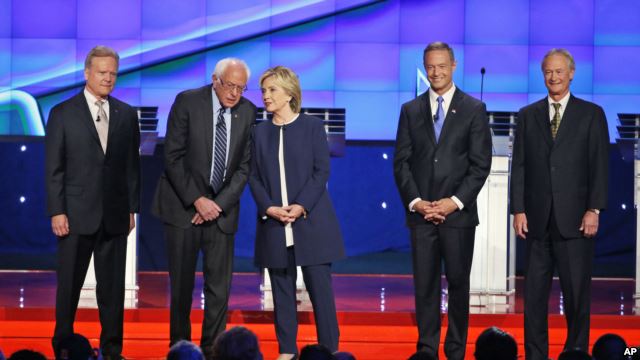
On the evening of Oct. 13 in Las Vegas, five Democratic Party presidential candidates took part in the debate for the U.S. 2016 general election. The front-runner in the Democratic Party race is former Secretary of State, former New York State Senator and former First Lady Hillary Clinton. During the debate, Clinton once again made some “unfriendly” remarks about China. Recently, Hillary criticized Xi Jinping’s persecution of Chinese women’s rights activists while Beijing hosted a United Nations conference on women’s rights, calling him “shameless” on Twitter. This resulted in fierce criticism from the Chinese media and some Chinese Internet users.
Hillary: Obama and I Were Hunting for the Chinese
At the Democratic Party debate on the evening of Oct. 13, Clinton defended her position on the issue of climate change. She discussed events at the 2009 U.N. meeting on climate change in Copenhagen, Denmark, saying “Literally, President Obama and I were hunting for the Chinese” [at the international conference]. According to Hillary’s 2014 memoir, “Hard Choices,” on that day she and Obama looked everywhere for the Chinese Premier Wen Jiabao. Prior to this, Wen Jiabao had twice refused to attend multilateral conferences attended by Obama, and only sent low level officials to attend instead, which considerably displeased the United States.
Hillary’s Harsh Criticism of Xi Jinping
From the beginning of the 2016 election campaign, both Democratic Party and Republican Party candidates have all revealed tough stances toward issues involving China, and yet it is only Hillary who has received particularly close attention from Chinese media and Internet users. A few weeks ago, Hillary attacked Xi Jinping on Twitter for his persecution of Chinese women’s rights activists while Beijing hosted a U.N. conference on women’s rights, calling him “shameless.” As this happened to occur during Xi Jinping’s visit to the U.S., Chinese officials issued a sharp response, and the Chinese official media and China’s internal Internet sites both condemned her remarks.
A semi-official editorial published in the Global Times criticized Hillary’s “vulgar words,” saying she had “lowered herself.” The editorial stated that “The Chinese are not necessarily angry with her, but we do think slightly less of her now,” while the Global Times’ overseas edition’s official WeChat page journalists, collectively known as “XiaKe Island,” have referred to her as “Aunt Hil.”
The Key Documentation Achieved at the Beijing UN Conference on Women’s Rights
Unlike the other presidential candidates, Hillary’s resentment toward China can be said to be well-established. Twenty years ago, when Hillary was still the first lady of the United States, she attended the U.N.’s Fourth World Conference on Women in Beijing. At the time she bluntly stated that “women’s rights are human rights” to infuriate the Chinese government. As she gave that speech, although she never mentioned China by name, she attacked the Chinese government’s actions depriving women of the right to choose to give birth, and forcing women to have abortions or to be sterilized.
The Chinese population’s recollections of Hillary will mostly come from her time as secretary of state during Obama’s first term in office. She was part of the team that worked on Obama’s strategy of rebalance toward the Asia-Pacific region. In September 2010, Hillary was present at the 17th Association of Southeast Asian Nations summit in the Vietnamese capital of Hanoi. At a meeting of foreign ministers, she specifically raised the issue of the dispute over the South China Sea, saying that it was an issue of U.S. national interest and a priority of American foreign affairs to find a resolution to the problem.
In the first half of 2012, while Hillary was responsible for American foreign policy, two major events occurred related to U.S.-Sino relations. The first was that former Deputy Mayor of Chongqing and Chief of Police Wang Lijun was detained after visiting the American consulate in Chengdu where he applied for asylum. The second occurred in April 2012 when the well-known blind Chinese civil rights activist, Chen Guangcheng, escaped house arrest and entered the U.S. embassy in Beijing.
Jin Canrong: China Is Familiar with Hillary
Vice President of Renmin University of China’s School of International Relations and expert in American issues Jin Canrong says that Hillary’s action of going slightly “too far” in expressing her views on China during the U.S. presidential election period is not at all surprising. “If she weren’t saying anything, that would feel abnormal,” he said.
Jin Canrong believes that China is already “considerably powerful” at present, and that regardless of who is elected in the next U.S. election, China can confidently deal with the United States. He says: “It doesn’t matter; if Hillary wins, she will maintain some level of policy continuity. Furthermore, we are very familiar with her so the power transition should be smooth; if it were a new person, some ‘wearing-in’ time would be needed.”
Ordinary Chinese Citizens Do Not Necessarily Know Who the American Politicians Are
When Hillary formally declared her candidacy for president in the 2016 U.S. presidential election, many voices opposing her emerged on Chinese social media. Many Chinese Internet users believed Hillary to be anti-Chinese, and that if she were to be elected she would complicate U.S.-Sino relations and even cause them to deteriorate.
The U.S.-based independent commentator and Chinese media observer, Wen Yunchao, believes there isn’t actually much to be said about the Chinese public’s opinions on Hillary. He says: “Basically, it is still the official media accounts on Sina Weibo [a Chinese micro-blogging website] that are the ones raising the queries and making the negative assessments. Generally speaking, Chinese Internet users in fact are not really familiar with American politicians. I think this is the fundamental point.”

Leave a Reply
You must be logged in to post a comment.